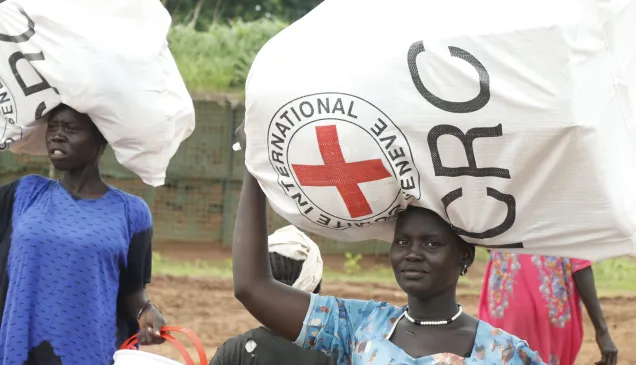South Sudan: Musa’s Journey of Resilience and Recovery
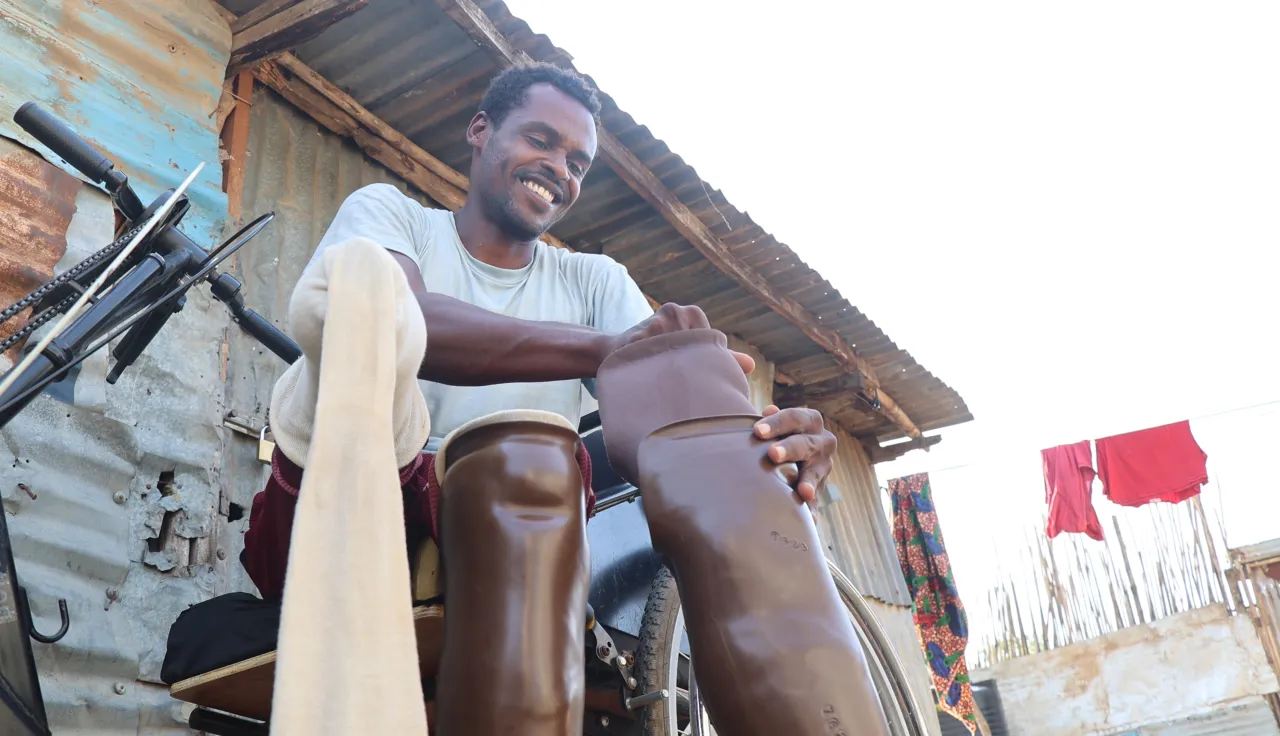
JUBA (ICRC) – When 32-year-old Musa Ali Musa arrived at the International Committee of the Red Cross (ICRC) – supported Physical Rehabilitation Center (PRC) in Juba on 24th March 2025, he was crawling. Today, Musa is walking again with the help of a pair of crutches, ready for a fresh start in life. His story is special – one of unimaginable hardship, resilience, and hope.
As a casual home interior decorator in Khartoum, the capital of Sudan, Musa was following his usual daily routine in December 2023 near a bustling market in the suburbs of Hajj when a sudden explosion shattered his life. Trying to suppress his emotions, Musa recalls desperately the series of events that affected his life. “There was an explosion and the next thing I knew was that I was on the ground bleeding,” said Musa.
Seriously injured in both legs, Musa was taken to the nearest hospital in Khartoum. However, his family struggled to get him the treatment he needed. “The hospital asked for a lot of money, which I did not have, so I was taken home,” he said. It took four days for his family to raise the money. By then, sepsis had set in. It was at this point that doctors told him that the only option was to amputate both his legs below the knees, to prevent the contagion from spreading to the rest of the body.
“The smell from the damaged tissue convinced me to agree immediately,” he says, quietly. But Musa’s biggest concern was not only the loss of his limbs, it was also how his wife would react. “Please feel free to return to your parents’ home if you are going to have a problem spending the rest of your life with a legless husband,” he told her. He was left speechless by her response. She chose to stay and offered him unwavering support throughout his recovery.
As conflict intensified around Khartoum, Musa and his family made the painful decision to flee Sudan. The journey to safety in South Sudan took more than three months. They eventually arrived at Wedweil Refugee Settlement in Northern Bahr El Ghazal State in March 2025, joining thousands of other refugees and returnees from Sudan. It was there that Musa first heard about the ICRC and its assistance to persons with amputation. He soon made his way to the PRC in Juba, a decision that would change his life again.
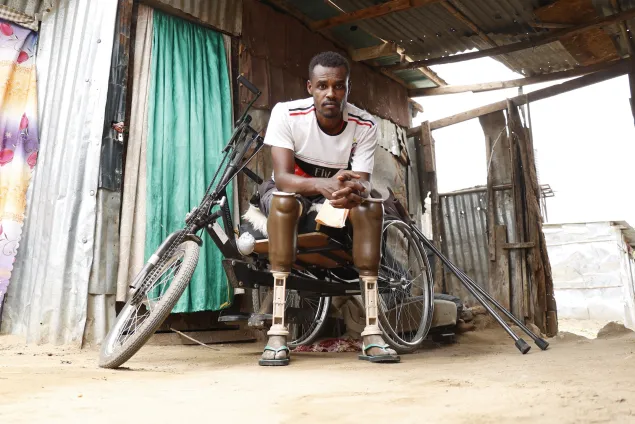
Musa is now able to sit on a chair again.
“When he arrived, he was crawling,” recalls Apeleo Samson Emor, a physiotherapist at the PRC. The team at the PRC assessed Musa’s condition and needs. With healed wounds, strong joints, and a positive outlook, Musa was now ready for artificial limbs. “Our main goal was to improve his mobility and independence,” Emor explains.
Tombura Joseph Kenyi, a prosthetist and orthotist, fabricated Musa’s artificial limbs. “It was a snug fit,” Kenyi says. In less than a month, Musa went from crawling to walking again. Each of the departments at the PRC—physiotherapy, prosthetics and orthotics, and psychosocial support—played a vital role in Musa’s recovery. “My main objective was to help him regain his ability to carry out daily activities,” says Kenyi.
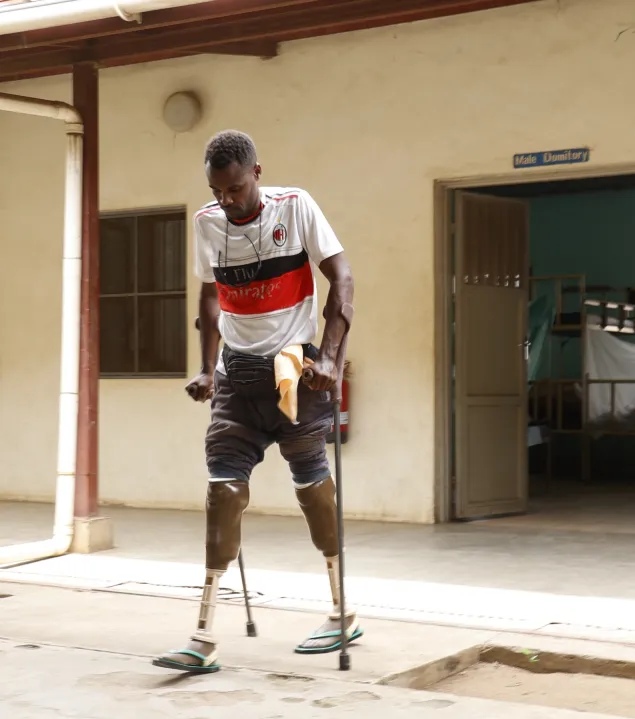
Musa learns to walk with his newly-fitted artificial limbs.
Today, Musa confidently moves through the center in his wheelchair, adjusting his seat and smiling at the team who helped him rebuild his life, while waiting for his prostheses, which are being fabricated in the workshop to walk again. Musa’s dignity has been restored. He is able to stand erect and is learning how to walk with his new artificial legs showing a lot of zest and appreciation to the team who helped him rebuild his life.
In South Sudan, the ICRC supports three PRCs in Juba, Wau, and Rumbek. Artificial legs, wheelchairs, crutches and other assistive devices are provided annually to about 3,200 persons with mobility impairments. From January to mid-May 2025, more than 2,500 South Sudanese and 343 Sudanese have sought physical rehabilitation services in the PRCs or during outreach field clinics.
Since 2009, the ICRC has supported physical rehabilitation services in South Sudan in partnership with the Ministry of Gender, Child and Social Welfare. The ICRC’s support includes provision of local and imported raw materials, components, equipment and machinery to produce assistive devices, scholarships for formal education abroad and in-country, on-the-job mentoring for clinical and technical staff and sector-level capacity strengthening.
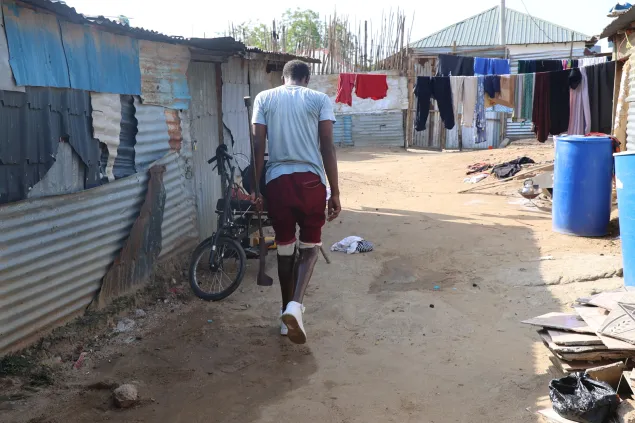
Less than three months after being admitted to the ICRC-supported facility, Musa is able to walk again.
The ICRC contributes to an enabling policy and legal environment for disability inclusion through its support to the domestication of the Convention on the Rights of Persons with Disabilities (CRPD), to which South Sudan is a signatory. In addition, the ICRC implements a social inclusion program that facilitates access to education for children with disabilities, and access to sports and income support for adults with disabilities.

